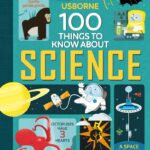
The Oxford Trust’s CEO, Steve Burgess, recommends 100 Things to Know About Science for its richness of content and many facts all packed into one book. By Alex Frith, Jerome Martin, Minna Lacey, Jonathan Melmoth, Usborne, and illustrated by Federico Mariani and Jorge Martin, this book is packed with facts about 100 fascinating and inspiring science topics, like black holes or spider venom.
There are also quicklinks on publisher Usborne’s website, where you can watch science videos, take quizes, and try their online experiements. (Ages 8+)
 Science Oxford’s Outreach Education Manager, Sophie Batin, recommends a few great books for younger readers.
Science Oxford’s Outreach Education Manager, Sophie Batin, recommends a few great books for younger readers.
Ada Twist, Scientist by Andrea Beaty, illustrated by David Roberts, is about curious Ada Marie, who asks loads of questions and has the traits of a good scientist. One day, when she notices a bad smell, she uses the scientific method to investigate the cause. Taking her inspiration from Ada Lovelace, the pioneer mathematician and programmer, the author Andrea Beaty, with illustrator David Roberts, has created an inspirational and entertaining book (Interest age 4-8; Reading age 7+)

Rosie Revere, Engineer by Andrea Beaty, illustrated by David Roberts, is about Rosie who dreams of becoming an engineer, but keeps all her tinkering and inventions to herself, until her great-great-great aunt Rosie helps her understand that sometimes you’ve got to risk failure before you can find success. (Interest age 4+, reading age 7+).
Sophie says, “My three-year-old loves them and they’d still be great up to KS2!”
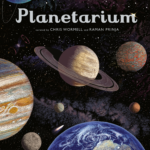 Planetarium by Raman Prinja, illustrated by Chris Wormell, is an absolutely beautiful and very informative book, says Sophie. Part of the Welcome to the Museum series, it explores all aspects of space, from the Sun and our Solar System, to the lives of stars, the Milky Way and the Universe beyond. (Interest age 9-11; 9+ readers)
Planetarium by Raman Prinja, illustrated by Chris Wormell, is an absolutely beautiful and very informative book, says Sophie. Part of the Welcome to the Museum series, it explores all aspects of space, from the Sun and our Solar System, to the lives of stars, the Milky Way and the Universe beyond. (Interest age 9-11; 9+ readers)
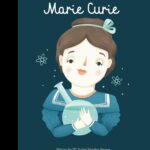 STEM Projects Officer Madelaine Swift recommends the Little People Big Dreams series by Maria Isabel Sánchez Vegara, including the various scientists’ editions such as Marie Curie and Steven Hawking.
STEM Projects Officer Madelaine Swift recommends the Little People Big Dreams series by Maria Isabel Sánchez Vegara, including the various scientists’ editions such as Marie Curie and Steven Hawking.
These books tell of the lives of outstanding people, who all achieved incredible things, yet each began life as a child with a dream. (Reading age 5-9)
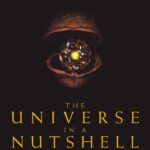 And, for adults, Madelaine recommends The Universe In a Nutshell by Stephen Hawking. Madelaine says, “he breaks down descriptions of quite complex topics into easy to understand concepts – and is quite funny!”.
And, for adults, Madelaine recommends The Universe In a Nutshell by Stephen Hawking. Madelaine says, “he breaks down descriptions of quite complex topics into easy to understand concepts – and is quite funny!”.
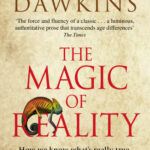 Our Planetarium Content Developer, Kat Kelly, recommends The Magic of Reality: How We Know What’s Really True by Richard Dawkins, illustrated by artist Dave McKean, which shares the magic of science with readers of all ages. Learn about a wide range of natural phenomena, as Dawkins answers questions like: How old is the universe? Why do the continents look like disconnected pieces of a puzzle? What causes tsunamis?
Our Planetarium Content Developer, Kat Kelly, recommends The Magic of Reality: How We Know What’s Really True by Richard Dawkins, illustrated by artist Dave McKean, which shares the magic of science with readers of all ages. Learn about a wide range of natural phenomena, as Dawkins answers questions like: How old is the universe? Why do the continents look like disconnected pieces of a puzzle? What causes tsunamis?
(For ages 12+)


 Science Oxford’s Outreach Education Manager, Sophie Batin, recommends a few great books for younger readers.
Science Oxford’s Outreach Education Manager, Sophie Batin, recommends a few great books for younger readers.

 STEM Projects Officer Madelaine Swift recommends the
STEM Projects Officer Madelaine Swift recommends the  And, for adults, Madelaine recommends
And, for adults, Madelaine recommends  Our Planetarium Content Developer, Kat Kelly, recommends
Our Planetarium Content Developer, Kat Kelly, recommends